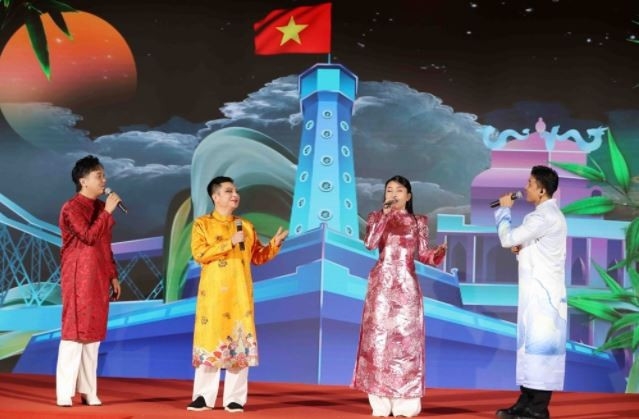In his opening speech, Assoc. Prof. Dr. Ta Minh Tuan, VASS Vice President, highlighted that Vietnam is entering a decisive phase of industrialization, modernization, and digital transformation, while China is pursuing high-quality development and expanding international cooperation.
    |
 |
|
At the Vietnam-China Friendship Cultural Exchange Program held in China to mark the 75th anniversary of diplomatic relations between Vietnam and China |
Although each country follows its own path, both place human capital, knowledge, and innovation at the heart of development, opening up opportunities for deeper and more substantive cooperation between the two sides while consolidating the foundation for stable and sustainable growth in their ties in the coming time, Tuan said. The workshop, therefore, was as a meaningful platform for experts and policymakers to share perspectives and clarify areas of cooperation aligned with regional and global development trends towards the shared goals of peace, stability, and prosperity.
Professor Zhang Yan Qui, Deputy Director of the Institute for Community with Shared Future, held that amidst rapidly changing world, communications and academic cooperation have an important role to play in promoting trust, understanding, and cooperation between countries.
He said the workshop was a vivid demonstration for the traditional friendship and extensive collaboration between the two research institutes, expressing his hope that both sides will further work together in research and training, making contributions to the Vietnam-China Comprehensive Strategic Cooperative Partnership.
Delegates at the event focused their discussions on key aspects of the bilateral cooperation, including economy, trade, investment, science – technology, education, culture, tourism, and people-to-people exchange. They agreed that while Vietnam-China relations are developing stably and delivering tangible benefits, both sides need to improve coordination mechanisms and remove barriers for more effective cooperation.
They suggested maintaining exchange of high-level delegations, consolidate political trust, expanding collaboration in strategic domains, and stepping up academic cooperation and people-to-people exchange. They also laid stress on the significance of implementing the signed agreements, promoting coordination in regional and international issues, as well as enhancing bilateral trade in a balanced and sustainable manner based on equality and mutual respect for each other's legitimate interests.
Experts underscored the role of the academic community in providing scientific evidence to support policymaking, thereby improving the efficacy of the bilateral cooperation in the new situation. They said academic forums, joint research projects, and university exchange programs were identified as pivotal foundations to enhance understanding, trust, and friendship between the people of both countries.
They expressed their confidence that with close direction of the two countries’ leaders as well as proactive engagement of research institutes, businesses, and scholars, the Vietnam-China relations will continue to develop in a stable, sustainable, and deep manner for the benefits of their people as well as for peace and prosperity in the region.
Source: VNA